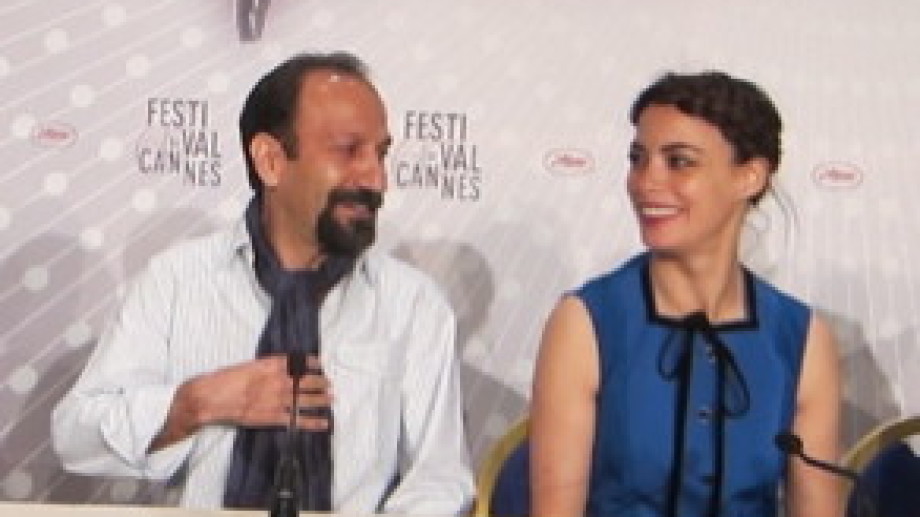
Tahar Rahim, Asghar Farhadi, and Bérénice Bejo at a press conference for La passé (The Past).
Outside the press conference room is an artist rendering of Iranian filmmaker Jafar Panahi joyfully waving on what looks like a film stock version of a magic carpet flying above a minaret-filled skyline, and next to him is the word “Liberté.” While Panahi has run afoul of authorities at home in Iran and is officially forbidden from practicing his craft, that did not stop him from collaborating on Closed Curtain, which premiered in Berlin in February.
It is not certain if fellow Iranian filmmaker Asghar Farhadi saw the piece as he made his way in or out of the press room today, where he spoke about his latest film Le Passé (The Past), which will have its world premiere Friday night at the Festival de Cannes, but Farhadi did acknowledge state censorship and how that has shaped his filmmaking, even when working outside the borders of his own country.
His latest feature, a follow-up to his 2012 Best Foreign-language Oscar-winner A Separation, stars Bérénice Bejo (The Artist), Tahar Rahim (A Prophet) and Ali Mosaffa (Somewhere Else) and is set in Paris, though he hinted that even in another country, the official confines he worked under continue to inform his choices. Characteristic of Farhadi's past discussions in public when the subject of the regime in Tehran is brought up, he chooses his words carefully.
“There are two kinds of censorship which work in an official way, and there's a far more sinister one which springs from a person's inner-censorship, which comes from a social situation that surrounds someone or something like finance,” said Farhadi. “When somebody works in a different [country], they're still working with assimilation—and that's a part of me. When I work with this assimilation, I try to see it as an asset, working within those [confines] and within that context.”
In the case of Le Passé, the context is one of the most anticipated titles of the weekend in Cannes. The story follows Iranian-born Ahmad, who returns to Paris to finalize his divorce with Marie, who has already embarked on a new relationship. During the visit, he sees that a unhealthy relationship exists between his estranged spouse and daughter Lucie. He attempts to repair their bond, but while doing so, Ahmad discovers a secret from the past that could cement their division.
“The relationship within a couple is the most complex there is,” said Farhadi, explaining why he consistently likes to center his stories around spouses. “You can rid yourself of the past and try and run away from it, but you [ultimately] can't. The past will eventually weigh in on he present. The past is no more clear than the future. Humans aspire to predict the the future and re-write the past.”

Bérénice Bejo in a scene from La passe (The Past).
At a lengthy 140 minutes, this sort of epic drama about the dissolution of a family is risky, even for a high brow audience like the one at Cannes. If the loud applause following the morning press screening is any indication, the film will have its share of positive critical response. For his part, Farhadi said he had all the tools he needed to make a quality film as a followup to the success of A Separation.
“I had no excuse to make a bad film,” he said. “Everything worked perfectly. I was satisfied with everything.”
“We tested a lot of things and did rehearsals for two months before shooting for four months,” recalled Bérénice Bejo. “It was as if we did 50 takes before we did the actual shooting. We had a clear path.”
Bejo said that American cinema had inspired her to become an actress and she enjoyed shooting The Artist in L.A., but with a new baby, she was pleased to remain in Paris for Le Passé. “For me, working in the U.S. would be fabulous, but it didn't work that way for personal reasons. Working with Asghar Farhadi on this film was the best situation.”
Farhadi himself said he fielded a number of North American offers after his Academy Award triumph last year, and while he expressed interest in working in the U.S. given the right situation, he wants to continue to work as he has in the past.
“I want to write and continue to work in the way I want,” he said. “Hollywood is a mixed bag. You can't say you hate or love everything that's done in Hollywood.”



